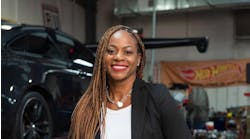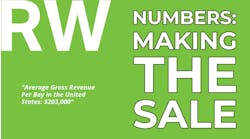The building was filthy. Located in a terrible part of town. Burdened with a terrible customer base. Anchored by a lack of leadership, foresight, ambition. It was the worst shop in America. And Jeremy O’Neal wanted to fix it.
“One thing I’ve noticed as a coach,” says O’Neal, president of AdvisorFix, “is that it’s easy to lose touch with reality of what shop owners go through every day. They try to drive a ton of cars in, but they're driving in the wrong kind of client. They’re busy, but not making money.”
That was the case at Freedom Automotive, which sat on the brink of bankruptcy in 2016, only pulling in $143,000 annually. In Hesperia, Calif., where auto repair competition is heavy, O’Neal had one goal when he took over in January 2017: turn the “worst shop in America” into a European facility that boasted the latest repair technology, a dream-team staff, and a $1 million annual revenue—all within one year.
This daunting task is the kind of challenge to which Doug McAllister can relate. Five years into his ownership of Douglas Automotive, his lone facility was maxed out in terms of shop and parking lot space, serving customers from around 150 zip codes. McAllister wasn’t ready to expand, despite $1.2 million in annual revenue. He was still “trying to manage the volume that [the shop] was dealing with.”
It wasn’t easy to establish the three successful shops that exist in the Chicago area today, but McAllister found a formula that closely mirrored O’Neal’s plans for Freedom Automotive. And the formula works: O’Neal did hit $1 million in that first year, and McAllister did learn to profitably manage a multi-shop operation.
Rome wasn’t built in a day, and neither were these two now-thriving companies. Equipped with a game plan, a winning culture and the right customer base, these two shop owners didn’t follow a path, but built their own as they guided their shops to success. Here’s how they did it.
SHOP STATS: Douglas Automotive Location: Three locations in the Chicago area Operator: Doug McAllister Staff Size: 27 Annual Revenue: $4 million
No More Fear
Doug McAllister first got a taste for management when he started working at an Amoco gas station in high school. He ended up effectively running the station, in addition to teaching himself how to repair vehicles. This led to a stint as fleet manager for Willow Creek Church in Chicago, which, in turn, inspired him to start his own shop. McAllister recalls feeling “scared, but excited.”
He took a month to repair the eventual shop building by himself.
“I thrive on start-up stuff; I just love it. To be able to take something and make it into something that wasn’t there, to me, is everything,” he says.
Once business took off, due in part to the connection to Willow Creek, McAllister thrived off a by-the-seat-of-your-pants approach.
In fact, you could say it thrived a little bit too much.
Not ready for being pushed to capacity day in and day out, McAllister found himself struggling to keep up with demand, yet not ready to expand. However, several management training classes made him realize that establishing a second shop was necessary and would help with this volume.
He bit the bullet and established a second shop.
The company grew rapidly, reaching $800,000 (in annual revenue) within two years. Growth stalled out until the location moved onto a more prominent thoroughfare. The third shop came out of convenience more than anything else, with it being located on a main highway in between the other shops.
It wasn’t easy to establish three successful shops over the course of 20 years. McAllister has a simple formula for how to last: the right people + the right place = longevity.
The implementation of this approach has resulted in a bit of acclaim in the community.
“We’re just kind of known; we’ve taken good care of our employees,” he says.
With numerous employees that have worked with him for 18–20 years, this is an understatement.
Essential Employees
Having such experienced employees has been conducive to the process of expansion. Once McAllister finds the right place, he knows he has the right people. He can rely on strong leaders who share his vision and values to lead new locations. These leaders work with McAllister over the course of many years, starting as technicians and learning the skills necessary to fill leadership roles. In one instance, a long-term service advisor became the “key guy” and leader at the newly established third location.
These long-term employees and eventual leaders were crucial to creating “a more systematic method for [each] subsequent shop,” he says. Given how much depends on a leader, McAllister emphasizes how important learned behaviors are to overall success. A high level of familiarity, built up over time, helps reduce the challenge of getting efficient processes and methods from McAllister’s head to being teachable and applicable.
McAllister’s approach to hiring new employees is also deliberate and mindful of longevity. He believes that an apprentice mindset with “home-grown” technicians (starting right out of high school and promoted over time) make for the best future leaders.
Allowing Autonomy
In addition to the employees themselves, there are numerous processes put in place to make repairs go smoothly. There are daily reports, templates, extensive training, and digital inspections, among other things. There is an accounting team to assist with the financial side of things. Despite all of these methods and ideas, there is no truly rigid approach taught to every new employee beyond the basics. Each technician develops his or her own individual process for getting a repair done. McAllister trusts that a tech will know what works best for him or herself and helps them to do just that.
The autonomy given to employees comes from an understanding of its effectiveness and from trust built up that employees will follow the basic processes the shop has established. McAllister understands that “with three locations, you can’t be there all the time,” but it’s still important to ensure consistency across all locations. He meets informally with one shop’s entire staff for lunch every week. This helps him to be familiar with all of his employees and creates a genuine sense of community. He also hosts a management meeting on the first Monday of every month. Managers are allowed to spend time talking about any specific issues faced by the shops, making sure that they are all on the same page. McAllister uses these more formal meetings to keep the culture consistent across all three shops.
Selfless Success
Consistent methodology and high quality employees are only two facets of an efficient and successful shop.
Community involvement has also been key for Douglas Automotive. McAllister’s time on several chamber of commerce boards helped increase his shops’ local profile.
“You’re out in the community, visible, rolling up your sleeves,” he says. Additionally, this creates more familiarity with customers, deepening the relationship.
“The customers, staff, and company all need to win, in that order. If any one of those doesn’t have a ‘W’ in their column, it’s not a good deal,” says McAllister. “I will always be the last ‘W.’”
This humility and selflessness is also reflected in Douglas Automotive’s tagline: “service with integrity.” After attending a training conference in Chicago, McAllister found that the answer to the question, “What are you looking for in automotive repair?” wasn’t price, but instead trust and honesty. The tagline aims to represent that attitude, the idea that it’s most important to “just do the right thing.”
For McAllister, everything goes back to his love of starting new things, whether it’s a new shop location or a relationship with a new customer. Despite this, he’s learned that he doesn’t have to start everything himself.
“The fear isn’t there anymore,” he says.
SHOP STATS: Freedom Auto Repair Location: Hesperia, Calif. Operator: Jeremy O'Neal Average Monthly Car Count: 150 Staff Size: 4 (2 technicians, 1 owner/service advisor, 1 CSR) Annual Revenue: $1.2 million
Building the Laboratory
For the past two years, Jeremy O’Neal has had to put AdvisorFix on pause—and if you’ve met him, then you’ve experienced his passion for coaching and understand how difficult that has been.
Starting out pumping gas and washing windows, it was a long, arduous road for O’Neal as he slowly became one of the most prominent consultants in automotive repair. After establishing AdvisorFix in 2010, O’Neal eventually stood out as a sales guru, teaching service advisors across the nation how to properly connect and communicate with customers in order to maximize ARO. And he wanted to bring that sales prowess to Freedom Automotive.
But it came at a price: By playing both owner and service advisor, the once near-bankrupt shop came to eat up O’Neal’s entire workweek, and AdvisorFix lost 60 percent of its business. His plan when he purchased the business in January 2017 was to get every single little piece of the renewed operation in place before hiring a suitable service advisor to take over his role and become the face of the business. By that time, he had hoped the shop—immediately rebranded as Freedom Auto Repair once he took over—would become a “laboratory” where can could plan, implement and perfect best business practices to pass on to AdvisorFix clients.
While a huge undertaking, O’Neal was confident that by utilizing the strategies he had fed shops for years, he could septuple his new operation’s revenue within 12 months.
Walkaround Marketing
While checking out at Walmart one year ago, O’Neal casually conversed with his cashier. The conversation was light, breezy, friendly.
And then O’Neal dropped the question.
“How is your car running?”
This particular cashier actually needed a new head gasket. Well, it so happens that O’Neal owned “one of the best repair shops in town” (as he put it) and could help. Within 30 seconds, O’Neal had drafted up a quote, offered up a “fair price” for the repair, and asked to tow the potential customer’s vehicle into his shop.
“That customer's family spent $8,000 with us this year,” O’Neal says. “There's so much business out there. Shops couldn't handle the amount of work that drives past their door every single day.”
From the very beginning, O’Neal’s plan was to get out of the shop and reach those customers driving by each day. That go-out-and-get-’em attitude led to several interactions like the one above and built Freedom Auto Repair’s reputation through these everyday interactions.
In fact, he’s got a name for it: walkaround marketing. And with no money available for marketing in the beginning, he found this technique to be much more effective and cost-friendly for getting the shop out of its initial rut.
“By providing 5-star service experience to customers, you can grow organically every day,” O’Neal says. “So from day one, I wanted to amaze customers with my level of customers service.”
It’s hard to argue with the immediate results: Within a few months, O’Neal says Freedom Auto Repair’s online 5-star reviews eclipsed shops that had been in town for 30 years.
Worth Every Penny
When O’Neal gave the Walmart cashier a quote for the head gasket, he told the new customer that this is what the repair “should cost.”
“Shops are afraid to charge what they’re worth,” O’Neal says. “It’s not uncommon to see a shop to think they have high labor rate, when their effective labor rate is really at about $95 per hour.”
O’Neal says that if you’re offering 5-star customer service and proper repairs, then there’s no reason your labor rate shouldn’t be raised. And if he could do that almost immediately after taking a shop with a shoddy reputation, then just about any quality shop should be ready to follow suit.
After taking over the front counter, O’Neal wasted no time increasing the shop’s labor rate by 75 percent, from $75 per hour to $128. This immediately drove out undesirable customers, and never deterred the people he had targeted through his walkaround marketing.
Since then, O’Neal has tinkered with the pricing and established variable labor rates for 10 different levels of repairs. While the base rate now sits at $129.98, he charges $115 per hour for “B-level” jobs like oil changes and $140 for higher-level repairs.
And because of his hefty investments in tooling (he plans to invest $20,000 per year over the next five years), he felt justified upping his shop’s diagnostic labor rate, as well.
“Eight out of 10 cars that come in need diagnostics,” he says. “So, we had to get good at selling diagnostic work.”
With O’Neal’s sales skills alone, Freedom Auto Repair was able to hit $1 million in annual revenue within the first year. And as soon as he’s able to put together his “Dream Team,” O’Neal plans to cap off his base labor rate at $200 per hour and push revenue even further.
Waiting for the Dream Team
O’Neal doesn’t believe in the technician shortage—he believes it’s more of a “leadership shortage.”
“Our job is to teach and train and build him up,” says O’Neal, who has really had to own that statement during his first two years of his operation’s tenure. Since January 2017, O’Neal has had to fire his entire technician staff six—yes, that’s right, six—different times and start fresh.
O’Neal understands that the average shop owner will look down on his inability to nail down the right team—and he accepts that criticism. Finding the staff that will ensure his shop’s growth has been a learning process for him, as he realized he needed to properly connect his vision with incoming employees.
“We don’t have technician issue. We fail to connect technicians with our culture,” he says. “We hold on to bad technicians because we think we need them. Really, we need to find guys with the right attitude and I can train them.”
Knowing his recruitment methods needed a change, O’Neal decided to invest more heavily in tooling and offer better benefits in order obtain the right technicians. By offering 401(k), retirement and medical benefits, giving each employee two weeks paid vacation (on top of two company-wide weeklong breaks each year), and upping technicians’ pay to $40 per hour.
Now, finally, after two years of patience and mentorship, O’Neal believes he has put together that dream team of technicians that can justify his shop’s high labor rate and dedication to diagnostic work. With the back of the shop now working in conjunction with the front counter, Freedom Auto Repair has pushed its net profit margin to 22 percent (30 percent is O’Neal’s goal).
With those pieces in place, the shop has found its flow and managed $1.2 million annual revenue. O’Neal now feels comfortable searching for a service advisor who’s looking for a lifelong front-counter job at his shop. As soon as he finds that salesman, O’Neal’s laboratory will be complete—and he believes it will churn out $3 million annually.
“Anybody can make $1 million in a year,” O’Neal says. “You can do with with blood sweat and tears and caring for people. Don't rest on your laurels. Get out there and do what you want to do.”



